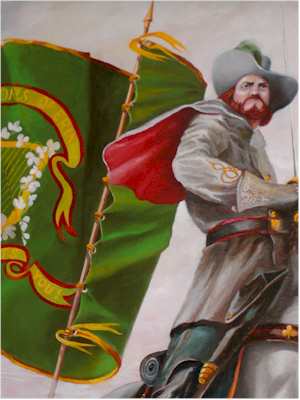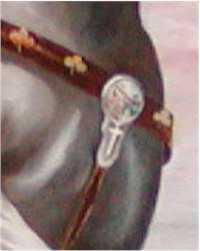|
Colonel
Randal McGavock: God’s Own Gentleman
from feature article in the Hinds County Gazette by Rebecca
Blackwell Drake
Jerry McWilliams, local
artist nationally recognized for his Civil War paintings, recently
unveiled his painting of Colonel Randal McGavock: God’s Own
Gentleman. The nearly life-sized work is the first of its kind
to portray one of the heroes of the Battle of Raymond.
“I’ve always been
interested in the life of Randal McGavock,” stated McWilliams. “Years
ago I found a copy of the out-of-print book, 'The Life and Journals
of Randal McGavock' and have read it numerous times. The book
vividly describes the battlefield death of Colonel McGavock as he led
the 10th Tennessee Irish on the Raymond battlefield in a charge
against the enemy. I felt compelled to portray McGavock during these
final tragic moments of his life.”
|

Jerry McWilliams unveils the portrait of Colonel
Randal McGavock: God’s Own Gentleman.
Col. McGavock, commander of the 10th Tennessee Irish, was killed
during the Battle of Raymond.
|
Those attending the unveiling
applauded as they viewed Colonel Randal McGavock mounted on a
magnificent gray horse. Standing beside McGavock holding the Rebel
Sons of Erin flag is his dear friend, Sgt. Patrick Griffin, a young
lad of 18, who was by his side throughout most of the war. The
backdrop of the painting shows the town of Raymond and smoke from
Bledsoe’s cannons on the far side of the battlefield.
Randal McGavock was born in
1826 in Nashville, Tennessee, to a family of wealthy Irish immigrants.
At the age of 21, he left Nashville for Cambridge, Massachusetts,
where he received his degree from Harvard. In 1858, after returning to
Nashville, he was elected mayor and served a one-year term. In 1861,
after Tennessee became the tenth state to secede from the Union, he
decided to leave office and join the war efforts.
During the Battle of Fort
Donelson, his first encounter with the enemy, McGavock was captured
and taken to Fort Warren prison, Boston Harbor, where he spent five
months. After his exchange, he found himself in Jackson for the
re-organization of the 10th Tennessee. During this time, his regiment
was assigned to Gregg’s Brigade, a brigade comprised of the 3rd,
10th, 30th, 41st, 50th Tennessee regiments, the 1st Tennessee
battalion and the 7th Texas Infantry. The entire brigade numbered some
3,000 men.
“Even though McGavock
joined the war efforts and commanded a regiment, he never gave up his
aristocratic ways,” McWilliams commented, “He remained a
gentleman to the core. There was nothing he loved more than the
luxuries of life - including stimulating conversation, good food, and
beautiful women. We know for a fact that in 1862, while the 10th
Tennessee was assigned to Jackson, McGavock found his way out to
Cooper’s Well Hotel near Raymond. He fell in love with the place not
only for the luxurious accommodations but also because the rolling
hills reminded him of Nashville.“
In May of 1863, after
spending a year in Port Hudson defending the Confederate stronghold on
the Mississippi River, Gregg’s Brigade was ordered back to Jackson
to block Grant’s advance into Mississippi. May 12, 1863, would be
Colonel Randal McGavock’s last day on earth.
The painting, Randal
McGavock: God’s Own Gentleman, depicts McGavock during the final
seconds of his life. Mounted on his beloved horse, he leads the charge
against the enemy. As his horse reaches the peak of the hill, McGavock
looks out over the battlefield and sees nothing but a sea of blue A
look of grim determination is on his face while Patrick Griffin,
holding the flag, depicts the same expression. The minute McGavock
yells CHARGE he is shot from his horse by a Yankee who
had the impressive commander in his sight.
 Using
a creative touch, McWilliams depicts, on the breastplate of the horse,
a reflection of the Yankee who fired the single shot. McGavock was
only thirty-seven years old when he died on the Raymond battlefield.
In the years to follow, Patrick Griffin, a survivor of the entire war,
often recalled his beloved colonel and subsequently dubbed him God’s
Own Gentleman. Using
a creative touch, McWilliams depicts, on the breastplate of the horse,
a reflection of the Yankee who fired the single shot. McGavock was
only thirty-seven years old when he died on the Raymond battlefield.
In the years to follow, Patrick Griffin, a survivor of the entire war,
often recalled his beloved colonel and subsequently dubbed him God’s
Own Gentleman.
McWilliams has numerous Civil
War paintings to his credit including a portrait of Jefferson Davis
with his Dog and The Sinking of the U. S. S. Cairo.
Regarding his paintings, McWilliams commented, “As an artist of
historical events, I feel fortunate to live in an area steeped in
history, such as the area around Raymond. Living in an antebellum home
that sent at least five men – a father, three sons and an uncle –
into battle is a great inspiration. I’m sure that McGavock, with
great wealth, good looks, social standing and political influence,
felt that he was invincible, as he rode up the slope and faced the
great ‘sea of blue’. He never dreamed that his life was about to
end. I wanted to depict him in his last moments of glory, not after
his death. Sometimes as I start these paintings I feel as though I am
a part of the actual scene or in the midst of the battle – and then
it’s time to hold onto the brush and watch the paint start to flow.”
Parker Hills, Civil War
historian, comments on the importance of McWilliams’ painting
saying, “One day in the not-so-distant future, Friends of Raymond
will have an interpretive center for visitors to both the town and the
battlefield, and Jerry McWilliams’ painting of Randal McGavock at
the Battle of Raymond will be the centerpiece. Jerry’s painting has
captured the determination of McGavock and his soldiers. It is with
this same determination that we will save this battlefield, in order
that future generations may remember the men, including McGavock, who
fought and died here.”
Colonel
Randal McGavock: God’s Own Gentleman will be available soon
Inquiries Welcome
Articles
About Randal McGavock and Patrick Griffin
Randal McGavock: Casualty During
The Battle Of Raymond
Randal McGavock: "Griffin, Take Care Of Me!"
The Ties That Bind: McGavock And Griffin
The Exploits of Patrick Griffin: "He Must Have Been Irish"
The Exploits of Patrick Griffin: "Finding A Gold Mine"
The Exploits of Patrick Griffin: "The Great Escape"
|



